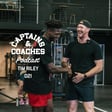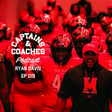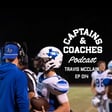Become a Creator today!Start creating today - Share your story with the world!
Start for free
00:00:00
00:00:01

010 - Youth Leadership Coaching Blueprint w/ Jim Kielbaso
The future of youth athletics isn't just about creating better athletes – it's about developing better humans.
Jim Kielbaso, from Impact Sports Performance and the IYCA unlocks the complexities of youth sports, shares insights on developing not only the physical skills of young athletes but also their emotional resilience and leadership abilities.
Training Programs - 7 Day Free Trial
Old Bull: https://bit.ly/old-bull-train
Captain's Speed, Strength, & Swagger: https://bit.ly/captains-train
#CaptainsAndCoaches #JimKielbaso #ImpactSportsPerformance #YouthSports #IYCA #InternationalYouthCoachingAssociation #YouthLeadership
Transcript
Introduction and Guest Background
00:00:00
Speaker
action. Welcome to the captains and coaches podcast. I am your host Tex McQuilkin and today I'm joined by my good friend Jim Kiyobasso, the owner of Impact Sports Performance in East Lansing, Michigan. Jim has been in the industry a long time and developed athletes from youth all the way and sending them to the professional level.
00:00:22
Speaker
He's an amazing coach and an even better teacher. This conversation, we get into the complexities of youth sports and the role of impactful coaching and the importance of emotional intelligence.
Emotional Intelligence in Coaching
00:00:34
Speaker
Jim shares insights on developing not only the physical skills of youth, but also emotional resilience and leadership abilities. We aim to bridge the communication gap between coach and parent, managing realistic expectations,
00:00:50
Speaker
and aim to use honesty to bridge the gap between athlete, parent, and coach. This is an awesome, insightful conversation with Jim. Let's get to it. Ready, ready, and break.
00:01:12
Speaker
Thanks, Tex. Thanks for having me on. Yeah, man. You're one of the first guests that I'm tapping in for the show, man. And I've always appreciated your work. I brought out one of the first books that I bought from you, the Ultimate Speed and Agility book here. So this is a crucial and a hidden nugget that I've held onto and allowed me to filter a lot of the training. And that's closed loop skills and open loop skills. And then when I'm piecing together sports practices,
00:01:45
Speaker
or having conversations with sport coaches from a strength coach perspective, just helping identify the differentiation of how we're building those techniques. This book painted that picture clearly, plus a whole bunch of drills for us to implement versus just running to run for punishment.
00:02:06
Speaker
ah Well, I appreciate that because that was kind of the reason I wrote that book is because at the time, at least everybody was just doing drills and no one was teaching kids how to move or how to do the drills properly to get the most out of them. And that was definitely the impetus of the book. Unfortunately, I think it's still going on to a large degree, but a lot more people now are talking about mechanics and how to move. So that's been great to see. Yes.
00:02:36
Speaker
All right, so well, speaking of mechanics and how to move and coaching, I see we got your facility impact in the background. So tell us about the mission there and what you're aiming to accomplish up there in Michigan.
Mission and Impact of Youth Training
00:02:50
Speaker
Yeah. So I'm the owner of Impact Sports Performance, and I'm also the president of the IYCA, the International Youth Conditioning Association. Both of them kind of have very similar similar missions. um The reason that we decided to call Impact Impact, I've told this story to a lot of people, when we were opening up, I had several different names to choose from, and my friends were rating them. And I was telling my wife, you know, ah about how people had rated them. And she said,
00:03:24
Speaker
Why are you even talking about those names? What does everybody say in handwritten cards and through text messages and phone calls? Everybody says what an impact that you've made on them, whether it's their career, or their sports, or their children, whatever it is. She's like, that's the name. And it really hit hit me. I was like,
00:03:43
Speaker
Yeah, that's it. That is the name. And the mission of the IYCA, which I had been running ah for a few years before that, is to create exception to help coaches create exceptional training experiences for athletes.
00:03:58
Speaker
And to teach them how to do that. And it really hit me. I was like, yeah, that's what we do too. We're not teaching coaches how to do it. We're actually implementing. We're trying to implement exceptional training experiences for young athletes. And as a part of that, it's making an impact on them. So that's kind of how the two things are tied together. And to me, that's kind of what gets me up in the morning is really just helping people achieve goals and get the most out of themselves.
00:04:27
Speaker
whether it's their career or being an athlete or creating an amazing podcast, like what you're doing. I just really enjoy the process of bringing good people together and creating something. I love creating stuff and then helping that thing become the best world-class version of itself that it can be. People helping people, powerful stuff. Yeah. I think it's important also to define youth.
00:04:56
Speaker
The immediate assumption and perception of youth is you know elementary school age kids that are first getting into athletics. You've got to set perspective on this because you've worked with kids all the way to professionals.
00:05:14
Speaker
Yeah, so I agree with you. The term youth, a lot of people think it's like toddlers. To me, youth is anything from like six to 18 or 20 years old.
00:05:26
Speaker
I mean, anybody that's been a college coach realizes that incoming freshmen and even sophomores sometimes, like they're still kids. And I don't mean kids like they're babies. That's not a, um, it's not a knock on them. It's like they're kids. They're just learning how to be themselves and figure out who they are and how to deal with other people. So I think it kind of runs that whole gamut of.
00:05:49
Speaker
from kind of elementary school all the way to at least getting into college, that that's what I consider youth. And that's kind of where a lot of people's development is. That's where a lot of coaches have a huge impact on people's lives.
Leadership and Development in Youth Sports
00:06:03
Speaker
I really enjoy that. I love working with older athletes, too. I love working with college and pro athletes. But our business is really all about kind of that middle school, high school type of age athlete that um we can really make a difference in their lives.
00:06:19
Speaker
Yeah, it's important in focusing on those, those transition timeframes, eight to ninth grade, JV to varsity. And then, I mean, the biggest leap is from high school to college. So getting them ready to physically, mentally, socially, emotionally prepare for those moments. It's not just sets and reps at a place like impact. It's this whole athlete development.
00:06:44
Speaker
Yeah, and and athletic development is not just teaching kids how to move or how to lift weights. It's also social, emotional, psychological development to kind of know what's coming to be ready for that. So that's a big part of what we do as well. And I'm sure that's kind of probably some of the stuff we're going to talk about today. For sure. I do want to lead off with, pun intended here, youth athletics leadership development. as we've We've hopped on the phone and i had a conversation that this this is needed, where parents assume that a sport coach at school is going to help them with their their confidence and their leadership development.
00:07:29
Speaker
At the same time, a lot of coaches are assuming that they're going to get these lessons at home. So where is that gap? Where's the challenge? And where can we find a solution? Well, the gap is kind of like everything right now. Like there's a giant hole in youth sports to develop leadership. And unfortunately, I think most coaches are tacticians, if you will, like they're very good at X's and O's and technical stuff.
00:07:59
Speaker
But for most of my life, we we, you know, there have been leaders. Things have changed and I'm not saying it's kids fault, just, but kids are different and they're not getting the same, maybe leadership opportunities and social opportunities that they maybe did in the past. And it's not everybody because there's some great leaders out there still. But I think some of the gap lies in parents have kind of.
00:08:29
Speaker
started to feel like, well, I'm just, you know, I'm sending my kids to you, to the coach, and or the teacher at the school, and you have to fix all my problems now. So, you know, like,
Parental Expectations vs. Coaching Reality
00:08:41
Speaker
my wife has been a teacher for a long time. And um there's a lot of parents that are like, I'm not dealing with that, like, that's why I'm sending them to school every day. And with the coaching aspect and the athletic development, I think a lot of parents feel like, well, I'm sending them to you. I'm paying for this club sport. You should be teaching them that stuff. You should also help my kids get recruited and you should help them be the best version of themselves and they should all get along and they should get everything here. um And I don't know that parents are doing it on purpose. I think that ah
00:09:23
Speaker
You know, I have three kids and parenting is really challenging. And if, um, if, if you don't have kids, um, you may not, you may not understand the challenges involved in, in just raising your kids. And I'm not saying that like I'm whining about it. I'm just saying that like, there's a lot to it. And, uh, I don't know that everybody, um, wants to do all of the things involved. I know I sometimes don't want to do all the things involved and but we all make mistakes, but, um,
00:09:53
Speaker
I think that parents need to be involved in that process. And I think coaches are sometimes scared to have parents involved because they don't want to step on toes. And parents are sometimes either scared or too bold and step on toes or don't want to get involved. And so there's just a lot of miscommunication, I think, as far as that's concerned with the leadership development. Yeah, I feel a lot of miscommunication and then misaligned expectations.
00:10:22
Speaker
So then, like you said, where parents expect the coaches do it all, and then coaches, again, they feel maybe that's not their responsibility. So then they don't take any responsibility and all or none kind of feel. Or they're in a position where they feel they can't make an impact. And then there's a lot of their own personal low self-esteem or barriers that are in place that then impact the kid. Absolutely.
00:10:51
Speaker
I think there's also a lot of missed opportunities for communication. And and a lot of kids a lot of kids realize that that a lot of their parents are going to kind of back them up no matter what. So they're a little bit reluctant to be coached hard or to be told things that they don't want to hear.
00:11:17
Speaker
because there are a lot of parents that will come back to a coach and say, you can't really talk to my kid that way, or you shouldn't say that to my kid. And I am by no means.
00:11:31
Speaker
telling people like you should be talking down to kids. But I do think that kids thrive when they have ah what there's ah an expectation of them and they have to meet that and they have to learn how to improve themselves to meet that expectation. And when kids learn that whole process of Here's the bar and I was here and I just got better by working harder or doing my best. And now I'm, now I've leveled up. That really helps self-esteem. Kids know when you're being fake. So they know when they haven't met the standard that they know, like if, if everybody has to make the run in a minute and they got it in a minute three, they know that.
00:12:20
Speaker
But if the coach doesn't hold them to that standard and say, well, you didn't get it. It's time to run again. This is just an example. Kids very quickly start to realize like. I don't really have to do anything. I'm just here doing my thing and they must need me here. So they're not taught how to live up to the best version of themselves. And I think that that's really hard for coaches these days to not push kids because they're worried about the pushback from parents or administration or whatever it might be. And I think kids want that in the end. And I think a lot of parents do too. They just want it done in a respectful way. Yeah. Time out.
00:13:01
Speaker
Let's take a quick break from this episode to talk training and the old bull program. This is a classic strengthening it strengthen character development program that is flexible and efficient tailored for busy leader, the busy professional. If you are managing or leading teams, this program is for you. You're going to develop physically, mentally, socially, and emotionally. Each block, I target a character trait for you to focus on that is negative and will eat your team alive. This could be anger. This could be envy. It could be a fixed mindset. So we hold the mirror up. We take these challenges on daily with puddles and and information and integration for you to bring into the training.
00:13:53
Speaker
I have two required days split push and pull that are heavy. The rest of the week is up to you for a choose your own adventure style. Different workouts ranging from 60 minutes all the way down to 20. This is a character development as much as it is a confidence and strength and conditioning program for you as leaders. I want you to look the part, I want you to feel the part, and I want you to lead the part.
00:14:20
Speaker
try a seven day free trial by clicking the link in the show notes for the program or bull and give it a ride. Let's get back to the show. Ready? you Ready to break. For applying that expectation, is there an opportunity where you level set how a kid can take criticism and feedback so that way you find just where they are and it's not pumping up the expectation to put all the weight on them?
00:14:50
Speaker
So are you asking if like I set something up, if I talk to kids beforehand about what it's going to be like? Yeah. So ah a level set on how this
Tailoring Feedback for Effective Coaching
00:15:00
Speaker
kid could potentially take feedback criticism within coaching. So that way you know how hard to push for them. You know, that's a great question. I don't know that I've ever like interviewed a kid beforehand to figure that out. Exactly. Uh, it's more kind of like.
00:15:19
Speaker
having some social awareness and ah and some emotional intelligence about the about the kid. um And sometimes you'll make mistakes, and then that will help you set that level. So you might just like shred a kid and then realize, um maybe that didn't work. Or you're being really soft on a kid thinking that they don't then they're not going to be able to take it. And then you realize, maybe I have to push a little bit harder. So I'm not sure that there's a simple way to do that.
00:15:49
Speaker
and And sometimes honestly, I'm not even sure parents know what's best for their kids in every single situation. Parents usually know what's best for their kids in a lot of situations, but a parent that comes up and says, my kid doesn't, doesn't do well when he or she's criticized.
00:16:11
Speaker
Is it being criticized or is it being given feedback? in a positive way, but and those are two different things. So it's an approach, I think. And I think everything with coaching, just as parenting, it's all balancing. So you have to balance coaching a kid hard with making it enjoyable enough. You have to have fun, and you know, that kids enjoy the experience, but hard enough that they're getting better. You have to.
00:16:45
Speaker
balance telling a kid what he or she needs to hear in a way that doesn't crush their dreams or hurt their self esteem. There's a lot of balancing that goes on. And I think, I think coaches need to have a lot of emotional intelligence.
00:17:03
Speaker
They need to be able to put themselves in that other person's shoes to see how what they're saying might come off. And and being self-aware of how you're coming across, I think, is another thing that a lot of people simply don't always have.
00:17:21
Speaker
so I think it's really important to have that empathy and that self-awareness of yourself and of how you may be perceived and how that other kid is taking your feedback out. I think that there's one group in particular that seems to have a real hard time taking feedback in groups. And that's like boys that are, I'll say like 12 to 16 years old, they're very vulnerable.
00:17:53
Speaker
but they don't want to say they're vulnerable. And I don't mean they're vulnerable. Like, oh, you're easy to beat up. That's not being, you know, that's not what I mean. They're scared of being told that they're not good enough in front of everybody. And so a lot of times when we're working on say speed mechanics, I'll take an opportunity to stop everybody and explain like, Hey,
00:18:18
Speaker
nothing that I'm going to say to you is about you as a person, it's all going to be instruction based. And I'll encourage them to not look around at what everybody else is doing and worry about how bad they look compared to everyone. Because they need to just be focused on what they're doing and how to get better. And I'll ask I'll say like, does anybody really care about what these other people are doing? Or are you worried about what you're doing? And most of the time they're concentrating on themselves, but they think everyone else is concentrating on them too. yeah And that's usually, it's just not usually the case. And I then, I then make myself a little bit vulnerable. And I explained when I was a kid growing up playing soccer, my left foot was terrible.
00:19:08
Speaker
And every drill that we did for the left foot, I would just get through the drill. I would, I would, I wouldn't kick it hard. I would just, I would just kick it a little bit so that nobody would notice. Um, and I would just try to get through the drill without doing something completely stupid. And as a result of that, I never was good with my left foot. Um, so I was trying to hide something that I was bad at because I was worried about other people and how they would view me.
00:19:37
Speaker
And it didn't work out for me. And then I explained to them, like, I don't want you to be like that. So don't try to just get through the drill without anyone noticing you. Like give it all you've got and do it for yourself. Not worrying about what other people are doing. And then sometimes I have to say like, and for, you know, for everybody else, for everybody here, like stick to yourself. We're not laughing at other people for messing things up. We're going to encourage them to mess it up so that they learn from that.
00:20:08
Speaker
And ah so sometimes I do kind of like set that environment or the tone of how the feedback's going to be given and what it might feel like. Yeah. i I think that's important. So I do a similar thing, but I can definitely frame up the expectation and purpose for my guys on my end.
Training for Pressure and Stress
00:20:26
Speaker
So I introduce one or two new warmup movements of practice, and I have my one guy be a demo. So they finish up their warmup laps, then they meet me at the 50 yard line, and then
00:20:42
Speaker
Two movements, I got two different demos and it could be a freshman, it could be a senior. So that way, like, I want you to feel the pressure. So that way I'm stress inoculating you for when you're the dude, you got the ball in your stick for lacrosse. So then they feel that. And then I mean, they make movement mistakes, but then I'm aiming to train the guys how to communicate and coach each other up. So then I'm.
00:21:10
Speaker
always in an encouraging mode versus like a punch or throw jabs at them. So they're in that position. Feel the stress. Well, all eyes are literally on them, but everybody's in a learning and encouraging mode before send 40 guys to finish up their lap and get in their lines and try this movement. Then they fail. Now I can jab and give them a little hard time in a playful manner to the seniors and the guys that need to get knocked down a peg or two before practice. I like that expectation and then giving them the purpose where this is what it feels like when guys eyes are actually all on you. When we separate and we're moving, now they're off. Yeah, I like that. I've been doing something. Do you mind if I keep going with this down this little rabbit hole? Recently, I've realized that kids have a hard time
00:22:08
Speaker
giving each other feedback. So there have been sessions in team session, team lifting usually, where I have told people, all right, during this segment, you need to give your workout partner or someone in your group, at least two pieces of positive feedback. And then I will give them examples of what positive feedback might look like. And very very simple. I mean, sometimes it's just like,
00:22:36
Speaker
That's a great rep, like a good job lowering the bar slower like we're supposed to, or it can be anything. And afterwards I'll say, did you get a piece of feedback? What was it? How did that feel? And it's very interesting. Kids love the, they love the positive feedback. They love getting it. They love to receive it, but for some reason they feel like giving it is weird.
00:23:07
Speaker
Or it's like, it's uncomfortable for them, even though they want it, they want to get it. And when you explain to them that the way you're going to get it is by giving it, because then that's going to create that exchange. It still is very difficult for them and it takes, it takes a long time for them to get that. And then later on we've, we've tried to then introduce some sort of, just some, some not negative feedback, but constructive criticism. So something that they could do better.
00:23:36
Speaker
and doing it in a way that's not that doesn't come off like they're being a jerk about it. It's just very instructional based. And man, for high school boys, that is really hard. Yeah. I don't know if I've ever seen more kids than right now, who they have a real hard time pushing each other in a way that's both positive and challenging, there's just not that many kids that are willing to compete with each other and like kick somebody's ass in a workout and, and be able to say like, like Tex, I just, I just crushed you. Like I just got way more chin ups than you. I know you can get more like, like go, go. I'm going to keep beating you at this. Like I just won that, that, uh, there's a lot of kids that have a hard time with that.
00:24:35
Speaker
until you start to develop it a little bit and make them realize like, hey, by you challenging Tex, that's gonna make Tex better, then he's gonna be a better teammate, he's gonna be better on the field, he's gonna then push somebody else and it's gonna make everybody better. It's really very difficult and challenging for kids I feel like to understand that whole concept these days.
00:24:59
Speaker
Yeah. Yeah. How I tackle that is manual resistance strength training. So again, lacrosse practice don't have access to the weight room. So we're we're just doing strength training on the field, but then imagine the Nordic hamstrings or resisted butterfly or resisted arm flies for for some chest as some examples.
Team Dynamics and Social Awareness
00:25:23
Speaker
Where i have to i have to monitor cuz there's a fine line between being a good teammate and being a jerk where you could potentially hurt them so i'm putting that responsibility on them.
00:25:36
Speaker
To that way, Hey, you're training to push each other here. And then if it's super easy, I've, I've seen enough reps that I can tell if somebody's not doing it well. And then guess what happens? Coach jumps in to be the resistance and actually show them how to do this. So it's as much as it is.
00:25:56
Speaker
like the strength training, the anticipatory tuner to apply this amount of force to this, as it is just being comfortable with each other to push one another. And I always mix it up where it's seniors, freshmen or offense, defense, and find ways to where you're not just trying to hide with your buddy on the team. It's always jumbling so that way we're building those relationships across the whole squad.
00:26:25
Speaker
Yeah, the and love it EQ for a kid, this is something I'm really going in. It all starts with that self-awareness. From there, it gets into the social awareness and I could argue the same path for a coach.
00:26:39
Speaker
because if i have my perfect program that i'm going to deliver and hand off to the kids but i can't read their body language fatigue attitude etc i got low social awareness now i start to blame the kids for just a bad workout versus looking at what I'm doing or connecting with the kids and what they're doing outside of here. So this this is a huge way to tackle that. And then I see this, I've taken on interns from strength and conditioning undergrads who have never coached. They got their degrees, they got their certifications, but then that baseline of the social awareness and ability to
00:27:22
Speaker
Uh, I mean, motivate an individual or lead a group. There's some stress inoculation that those coaches need to take on as well. Oh, absolutely. We, we call that the, the hard stuff and the easy stuff for our interns. Um, cause all of our interns come in and we've got a whole curriculum for them to learn all the training stuff. And then there's going to be the applied part of it, the coaching part and I try to tell them upfront, all the things that you think are the hard things, like the programming and the sets and reps and knowing all this stuff, that's gonna be the easy stuff. The hard stuff is gonna be the coaching, the yeah giving instruction, giving feedback, giving cues, making a connection with somebody, motivating them, challenging them, confronting them,
00:28:20
Speaker
That is the stuff I would way rather have somebody that's good at that stuff. And I can teach them how to the X's and O's, but the people who come in as coaches who have all this book knowledge and then think that because they passed a test or something that now they're good and they just can't communicate with people. That's really challenging. That takes a long time.
00:28:48
Speaker
it It's very difficult. And unfortunately, I see that a lot with young coaches that they want to be, you know, they're young or they're new to the coaching world or the training world. And they see somebody coaching high level people and they're like, I want to be that right now. Just give, just I can do that. Well,
00:29:16
Speaker
Good, good luck. Like it takes a while. It just, it takes a long time. It takes a lot of trial and error. And I think that there's, I think more young coaches need to have some patients and ah patients with themselves to learn and some self-awareness that yeah, you're good. You might be really good right now, but you're going to be way better.
00:29:38
Speaker
Like after you do some more coaching and learn how to apply this stuff. And I was, I was broken down as a young coach and told that I didn't know anything. And, um, and at the time I was like, wow, like, I can't believe I'm being told that I don't know anything. I passed my test and I have my degree, but man, what a great lesson it was. Cause I didn't know anything. I didn't know anything. And, uh, and it really did, it it really did help me. So, uh, I,
00:30:08
Speaker
I kind of almost wish that more coaches were willing to tell kids things that they need to hear. When I say kids, I mean young coaches so that they can get through that phase of their career a little bit faster. Yeah. I hope everyone's got that welcome to coaching moment.
00:30:28
Speaker
that they made a decision, self-awareness, to continue on and develop and learn and get better versus scoff, take it personally, and then you know continue to say, hey, that person doesn't know what they're doing. or i know You know, again, that low self-awareness, uh, mine, mine came with an injury where I took away a kid's lacrosse career, my first training session as the strength slash sport coach. So unfortunately I, I, yeah, I didn't say, Oh, I have the perfect program or you're weak. No, it was, it was me. I, I took ownership of that moment and then.
00:31:09
Speaker
Needed to deep dive and get the understanding and then I was fortunate the social I started coaching my lacrosse team so I was went from captain to grad assistant coach so these relationship skills I I had the relationship and then when I changed schools in different ranks and went up in in the coaching ranks then I had to relearn how to these EQ skills because it it just came too easy because I was already invested with the guys I was coaching. Yeah, I had to learn that later on, but then leaned into what worked for me way back, which is just being relatable, being and an athlete in one way, shape or form with these guys to show them that, you know, either I'm stronger than you, I wasn't at once and it took this long or I've ah played your sport. I've been in your shoes and just finding a way to connect.
00:32:05
Speaker
then gain confidence to listen to my coaching feedback and criticisms, but still with their end in mind to get better and succeed. Yeah. And I'm sure you realized really quickly that you you had to approach people differently and also act differently at different times. You can't just be the same person all the time, the same vibe every single day. I mean, there's going to be differences. And I think a lot of people.
00:32:35
Speaker
I think that's challenging for a lot of young coaches. I know it sounds weird, but I did a lot of theater and shows and stuff when I was younger and I sometimes view coaching as almost like being on stage. Like you're putting on a show and I don't mean it like you're putting on, like you're being fake. I mean it like, Hey, everybody's there.
00:33:02
Speaker
for you or you I'm sorry, you're there to give everybody energy and to create an atmosphere that is the right atmosphere for this particular group. And if you're just a high energy in your face kind of coach all the time, that's maybe not going to work with every group. So you have to learn like, when do you have to be high energy?
00:33:24
Speaker
And when can you kind of lower the temperature a little bit? and And when do you need to talk a little bit faster and be a little bit more intense? And when can you soften things up and bring a kid to the side one-on-one and just have an individual conversation? It's not acting in the sense that you're being fake and you're being another character. It's understanding that you're You're part of the atmosphere and the culture and how you deliver your coaching is going to make a difference for them. Well, yes. And that's that EQ as, as actors, they have this range of abilities to display the different emotions that the script calls for same instead of me reading a script. Now I'm reading the room.
00:34:15
Speaker
Okay. They need me to to turn it up here. And sometimes that's anger. Sometimes that's, that's emotion. Sometimes it's ah just pleading with them to want it as bad as you did as breathe as much as you want to breathe. You got to do the old ET hip hop preachers. So it's yeah it is that EQ, but instead of reading a script, I'm reading the room. And you have to be self-aware enough to know that What you're doing is affecting the room and how you're coming off, you can change. And again, I don't mean you have to be something you're not, but this is a funny story that I think is.
00:34:59
Speaker
You know, people can take it for trying to try to take this story as like, all right, what am I doing? That's like this, not the exact same thing. But I had a coach, kind of a big guy with a loud booming voice. And, you know, he was pretty tall and, and he always looked like this. I don't know if people aren't listening or if they're just listening right now, like his eyebrows were always like down and like, you know, pushed together. And he was asking me.
00:35:27
Speaker
He's like, I feel like a lot of kids are scared of me. Like they think that I'm mad all the time. And I'm not mad at all. And I said, well, you have a pretty loud, deep voice. And he's like,
00:35:41
Speaker
Yeah, I know, but I can't really change that. And I said, I don't know if you've ever noticed, but you always have your eyebrows down and like squinted together. He all of a sudden like started moving his eyebrows around and, and he kind of like touched that area. And he, he was like, wow, I don't think I ever noticed that.
00:36:03
Speaker
He's like, oh my God, that's going to make a difference. And I was like, yeah, like we all need to sometimes be told something that might be as silly as like, you look mad because your eyebrows are down and people are going to take it that way. Or people aren't going to take you seriously because you're walking in on your phone or you're dressed bad or you smell terrible or, you know, whatever it is, like people have to be aware of, of how their,
00:36:33
Speaker
their aura is going to be perceived by other people. Yeah. And it takes a good teammate to call him out in a way where they can take that feedback versus putting up the wall against you. So it's good in that you were able to deliver that feedback and he was willing to listen. So the win yeah on both sides of the fence there. Yeah.
Self-Management and Parental Alignment
00:36:59
Speaker
Speaking of their self-awareness, their social awareness, there's also self-management. And this is a big step for a lot of young coaches. They expect self-management out of their athletes, showing up on time, remembering two cleats, which seems to be an issue sometimes. So that self-management does go a long way for also now your athletes see that you're showing up on time, clean shaven.
00:37:29
Speaker
You have your plan ready to go. So what are, what are some lessons that sometimes you got to teach to interns or young athletes that are connected to that self-management? Well, I don't think it's just interns. um I guess it's kind of anybody, including myself.
00:37:50
Speaker
You have to be able to be what you're expecting other people to be and not necessarily like I have to be fast because I'm teaching people how to be fast. But the approach has to be there and the intent has to be there. If I'm coaching kids and I'm screwing around or I'm late, that's going to be Uh, that's going to lower their perception of how professional I am or how they're going to take me. And I think kids need to be taught or shown that, Hey, you know how when everybody's bringing their hands up together, you know, in the huddle and and before like a breakdown, I've said this to kids before. I'm like, when you're off to the side and you don't have your hand on anybody and they say one, two, three family, and you're just like.
00:38:41
Speaker
want to, and then you're walking away and you're not being part of it. People notice that. People notice it. And I don't want the rest of the team to think that you don't care and you don't want to be part of that family. So I really want to encourage you to to to know that other people see what you're doing. And then when it's crunch time and ah You want to say something? If you haven't been part of that culture, people aren't going to receive it very well from you. Just as I feel like I had one of my, a guy that I used to coach with who's been a really successful basketball coach for years said, when your best player is not your hardest worker, you're going to have problems because people are going to look to a leader
00:39:34
Speaker
And that, oh, that's how I should act. And there's no way around it. The best player is often regarded as like the alpha, like, all right, well, that's how I have to be. Cause I want to be more like that person. And if they're not working hard, it's going to really make other people.
00:39:53
Speaker
you know, tone down their work. And it's going to be like that for you as a coach. If you're, if you're lackadaisical, your team's going to be lackadaisical, or at least you can't set that standard. So you have to at least be, uh, or, or, or try to emulate, you know, what you want everyone else to be too. It's, it's, it's a challenge. I think it really is a challenge. Does that make sense?
00:40:19
Speaker
Big time. Yeah. The thing I like to explain to coaches leading by example is not optional. This is the way. And that's as much as it is training, sprinting or, or skill work. Most of the coaches, when they get into sports coaching, their skills are where they need to be to coach at high school or college level. So that's not part of it, but at the same time you can control your physical appearance, your strength.
00:40:48
Speaker
And even sprinting and speed and agility, I don't have to do it as fast as my NFL combine guys, but I need to model the positions that I'm expecting and going to lead them. So I can model well enough to then hand off the explosive and opportunity to be awesome to those guys. So it is important in leading by examples, not optional. Yeah, I totally agree with that.
00:41:18
Speaker
Yes, I do want to take some time now to get into parents and explore this for a little bit because yeah you are running a facility and parents are paying the bills. So they are technically your customer, even though you're delivering your services to the kids.
00:41:37
Speaker
Now, parents, they come in with high expectations. What is your way to establishing the goals for the family? And then if their expectations are well beyond the genetic potential of this individual, how do you manage, temper or align expectations for the service that you can provide? Well, I'll start off by saying.
00:42:03
Speaker
I've been fortunate enough to have some amazing families that we work with who are pretty receptive to what we do and to what we're going to be able to do. We can't make everybody fast, but we can make them faster. So I'm not going to have somebody come in that's can run a five, five 40 and turn them into Usain Bolt. We're not trying to create.
00:42:33
Speaker
world record. achievements for every kid. We're trying to take them from point A to point B and just help them improve to be the best version of themselves that they can be. So a lot of times we'll do some, ah well not all the time, we'll do an initial evaluation and often that evaluation um kind of brings people down to earth a little bit because everybody thinks that there's something that, you know, like once the stopwatch or the, you know, the
00:43:05
Speaker
the timing system or whatever it is, is on, they realize like, oh, uh, I guess that's where I am and we can set our expectations from there. When we're talking about speed development, I like to explain what a 10th of a second looks like because I've had situations where we've had kids knock off like two 10ths of a second off of their 40 yard dash and parents are like two 10ths of a second. That's like that. That's nothing.
00:43:34
Speaker
And in my head, I'm like, Oh my God, like two tenths of a second, like off your 40 hour dash in two months. Like that's crazy. So I have to explain to them what a tenth of a second would look like on the field, which is beating yourself on a 40 by about two to three feet is the tenth of a second. And so sometimes we'll have visual examples of that.
00:43:59
Speaker
Other times I have to explain that things happen very slowly and you're not going to go from bench pressing a hundred pounds to 200 pounds in the next six weeks. Like that's just not how strength training occurs. Like everything takes time. And then really trying to, trying to get parents to to buy into the, just the concept of long-term development and that everything is about the process of learning how to work so that you get a little better and that makes you want to work even more so that you keep getting just a teeny bit better each day. And so the value of small improvements, just incremental improvements, and it's not going to be linear. You're not going to get better every single day. You're going to get better and then you're going to,
00:44:48
Speaker
It's going to die off and then you're going to get better and it's going to die off. And being able to work through those kind of ups and downs is very important for parents who come in. I haven't had that many parents tell me, Oh, my kid has to run a four, four, and they're currently running a four, nine. And that's just gotta be that way. I have no problem telling them like, well,
00:45:15
Speaker
He might be able to run a four four at some point, but that's not going to happen this summer. I don't have a problem with that because honestly, at this point in my life, if somebody doesn't want to train with us because I'm going to tell them the truth and paint a realistic picture.
00:45:31
Speaker
I'm probably better off having them not even start than to be disappointed in the end, even when we get really good results, be disappointed in them. um So we do have to kind of temper those expectations. I think a harder situation that I have to deal with are those kids who see a lot of success early on in their careers. And the parents think that, oh, my kid's going straight to the pros.
00:46:00
Speaker
um to to help them realize that, yeah, your kid is good right now. But he or she has a lot of things that need to be worked on. And through the ah process of our evaluation, it really does help kind of show parents like, well, here's how your kid's running. And here's what he or she should like, here's we're going to help them be able to do. Here are the scores. Here are the scores of people that you that your kid thinks he or she is going to be like.
00:46:31
Speaker
And you're not really there yet. Strength levels are different. yeah Just the whole idea that you're great right now, but you've got a lot of room to improve. That's very hard for a lot of people to accept, especially when they're having a lot of success on whatever team that they're on. It's also difficult sometimes when a kid is at a say at a school. And they're the best. Let's just say football player. They're the best football player at their school. But their school isn't very good. Yeah. And all they're doing is comparing themselves to the kids around them. And they're like, I'm the best kid on my team. I'm the fastest kid on my team. Well, yeah, you're compared to all these other
00:47:25
Speaker
sub par athletes, you're the best one. But if your goal is to play in college, for example, or whatever they tell me their goal is, you're gonna have to compare yourself to the best kid on every single team that you're playing. And you might be better than some of them. And then there might be others that are better than you. And somewhere out there, there's gonna be a lot of kids that are better than you. And that's what we're trying to get you to be the best version of yourself. And that's gonna be uncomfortable sometimes. Because I think a lot of kids It is uncomfortable to be told that they're not good. It can come across that you're not good enough. And that's not what you want to make sure that you're not telling them you're not good enough. It's, I think you can do even better. And I think that's a pretty powerful way of putting, I want you to be the best ah version of yourself that you can be. And right now.
00:48:20
Speaker
I think you can be even better than this. You're already fast, but I know you can be way faster or you're already strong or you can be way stronger, whatever that might be. I think that's a powerful message, especially if you have a plan in place that can show them that they can get better because then you're being honest with them. And I think honesty is always the best way to approach things. I think kids getting blown up at an early age and told whatever they want to hear.
00:48:48
Speaker
It's attractive and it's attractive to a lot of parents, unfortunately. ah They want people to tell them how awesome their kids are. ah Go ahead. You wanted to say something about that. Yeah, that that's going to be our next block of conversation, but I do want to highlight how, how you're framing. It's you're not good enough. I, you're framing it. You're not saying that at all. It's, I feel.
00:49:11
Speaker
that you can level up. I feel that there's room for you to grow. So you're framing it as potential and we're readjusting their aim versus being satisfied with their current position. In that conversation, I feel then it's a great chance to highlight wins and then behaviors that can lead to further success, sleep, nutrition, a lot of the little things that they most likely are not doing.
00:49:39
Speaker
you're you're readjusting their aim and then highlighting behaviors and small ah low hanging fruit that can help reinforce your argument if they start to do it. ah To hold your thought because I wanted to keep going on that because I think something that I try to do and try to encourage all of our coaches here to do is that it's fine to tell kids like, no, that wasn't right. As long as when they do it right,
00:50:07
Speaker
you're like celebrating it. You're like, yes, that was it. And I try to get like really animated. I'm like, yeah, yes, that was it. You know, and like, all right, now, can you do it again? And they do it again. And you're like, yes, you got it. You got it. And then if they mess it up, it's okay to say that wasn't it.
00:50:26
Speaker
what did you feel? And then by that time, you hope that they can somewhat self coach and be like, Oh, I did this, I should have done this. You're right. Do it again. Yes, that was the right one. So you have to give them the positive and the I don't want to say negative, but they have to know when it's right and when it's wrong so that they can start to self coach themselves. Yeah. And what were you gonna say? The final Final to close this book is The Celebrate. I yeah love that you're getting expresses in there. I've found that I need to teach kids how to celebrate one another. So if one of them makes an amazing play and I'm not in on the sideline or wherever, I'm celebrating it and then we're doing that in practice. So come game time, if some dude that is not you does something amazing,
00:51:21
Speaker
you're then elevating on the team versus the reverse, which could be I could have done that better, which I feel that celebration then teaches them how to build up when a mistake does happen versus the pile on. They feel bad enough. Let's not shame them.
00:51:37
Speaker
yeah So what you mentioned earlier, I want to spend some time with on the the truth. Yeah. This is, I'm going to frame this with the the current situation that I feel the sport of lacrosse is in.
Navigating Coaching Expectations
00:51:54
Speaker
And you may have experienced this with soccer or basketball and a lot of the kids that you work with that also do school and club sport.
00:52:04
Speaker
Club Sport, a coach's I feel, at least in the region I'm in, they will tell a parent the most fantastic lies about their kid to make sure that they sign that big check and get their kid for the summer.
00:52:20
Speaker
When they come back to the high school level, now the high school coach becomes the bad guy because they're telling them truth. They're getting pennies to the dollar of the club coach. So now all of a sudden those fantastic lies, the coach the high school coach becomes the enemy.
00:52:39
Speaker
This absolutely i just gets my blood boiling when i I experience or I connect with coaches that are at the high school level and then they're they're experiencing the same thing. So now the stopwatch you've said earlier is a great example to tell the truth.
00:53:00
Speaker
But skills are a little bit more challenging to demonstrate to parents the truth here. So what are some tools that we can empower coaches to manage these fantastic lives that certain coaches are utilizing to put some money in the bank?
00:53:18
Speaker
So you're asking like, how can we explain to parents that they're being lied to sometimes? That basically without saying your kid sucks. It's just somebody told your kid that they're up here when, Hey, we're level set right where we are. And they're right on track. However, they're not as good as you were sold. They were sold. Yeah. They were sold something that they're not. Yeah. yeah i I think some of that comes down to perceived credibility ah ah of the coach and perceived level of caring about the kid and the family. I think a lot of times people don't want to listen to that kind of feedback because
00:54:12
Speaker
going back to the EQ, coaches don't self-regulate. They get really annoyed or irritated by a kid. And then when the conversation comes up about their ability levels, they come off like like really mad or irritated or annoyed by the kid. And it can sometimes be really harsh, maybe overly harsh, unnecessarily harsh, I can say.
00:54:41
Speaker
And I feel like when people are told too harshly the truth, they perceive it as like that guy's an ass. And I mean, it's just like parenting. You have to be just, like I said earlier, it's all balancing act. Like if your kid does something wrong, you have to appear upset enough that they know you're upset, but they have to focus on their behavior, not let them focus on your reaction. Because if if they're focused on your reaction, they don't, they're not learning how to change their behavior. They're just like, Oh, he's he's crazy. Or my dad's yelling at me and what a jerky is, you know, something like that. So it's the same with the coach.
00:55:33
Speaker
Kids have to, it's really hard for a kid, especially younger kids to hear what the coach is trying to say through the way they're saying it and to ignore how it's being said and focus on what's being said. I think that that's really difficult. So coaches have to, I think kind of use some of those acting tactics and be very pleasant if you will, about how they're delivering information, almost like there's a funny adage, like you have to like tact is the ability to tell someone to go to hell so nicely that they almost look forward to the trip. And ah it it's, ah you know, you have to be able to tell the kid what they're doing well and what they can do better. And then, you know,
00:56:31
Speaker
politely and nicely and gently say, but in this area, this is an area specifically where I feel like you can get better. And I think coaches are oftentimes scared of being specific and that creates confusion with kids and parents because I hear it all the time from people, you know, I'm not playing very much. Well, what did your coach say? Coach just said, keep working hard.
00:57:00
Speaker
Well, that doesn't help the kid. That just frustrates the kid. They need to know. Well, I noticed in this situation, or it could be like, if it's lacrosse, your stick skills have gotten a lot better, but when the defender knows you have no left hand.
00:57:20
Speaker
they can cut off your angle differently. And I really think if you work harder on your left hand, that's going to open up your right hand too. So I've noticed that you don't have as much confidence in your left hand. I really think working on the wall on your left hand or your left hand shot or whatever it is that you're trying, whatever it is. Like here's the specific situation that I think you're having a hard time with that's going to help you level up.
00:57:50
Speaker
I think that that's, I think that that's great. I think that giving somebody something specific to work on is much better for them than, Oh, you just keep working hard. You know, like you're doing a great job. Just keep working hard. but No, tell them like, well, uh, you know, I'd like to put you, I'd like to put you in, but like, uh, I can't have you at defensive MIDI because you're the,
00:58:19
Speaker
Uh, every time you're one-on-one, like the opponents are faster than you. So you really need to work on your speed or I need to teach you some angles and oh, you do really want to get better at this. Okay. This is where coaches miss another opportunity. I'd be happy to sit down and show you like, let's work on this. I'm going to show you what you're deficient in. Then you can go work on that and I'll help, I'll help you get better at this.
00:58:48
Speaker
I think that that people really appreciate it when someone's told like, here is exactly what I'm seeing you're not good at. And I'm willing to help you with that too. Yeah. How I've found success is framing the different parts of the season. So where the club is beneficial is when you're getting those reps where you're the guy, the ball's in your stick.
00:59:16
Speaker
You're also experiencing different, you're traveling to different cities, you're experiencing different competition. So that's when travel's beneficial. When we're focused on our city, we've grown up with these kids, we know their strengths and their weaknesses, so we're going to then play to that. So aim to frame the different parts of the season. In the fall, we're focusing on stick work. We're getting farther away from the offense. We'll install that during January.
00:59:46
Speaker
aim to frame the season so it's not black or white. It's saw all or nothing as they may perceive whatever it is they were told those fantastic lies by the that the club coach.
00:59:59
Speaker
and then yeah so that's but yeah i've I've had to work on that acting a lot just to keep that smile on and keep them progressing. And then I've heard you say this before where a lot of the goals of the youth sports is to make sure that the sixth grader is a seventh grade that plays, the seventh grader that plays and keeping them enthusiastic no matter what part of the year we're in and looking forward to the next opportunity, wherever that may be.
01:00:35
Speaker
Yeah, especially at the younger age, uh, age groups, like the goal of the coach should be to make it enjoyable enough that they want to play the next year until, and keep
Conclusion and Appreciation
01:00:46
Speaker
playing until they can start to figure out like, do I want to work harder at this and I'm going to take it on myself or, or not. But a lot of kids, I think it's a 70% dropout rate in sports occurs around age 14 and.
01:01:04
Speaker
They're, you know, it's not because it's, it's oftentimes not because there's not good athletes. It's because they, they're not enjoying it anymore. And there's too much pressure on winning kids, kids in, in study after study, kids say that their favorite part about sports is not winning. Like it's like, that's low, low on the list, but.
01:01:31
Speaker
but parents still, you know, pushed it. Well, we got to win and the coaches feel that pressure that they have to win. And I'm not saying winning is bad. Like, yeah, everybody has more fun when they're winning. So get them better. So you win more games, you know, uh, instead of just worrying about winning all the time and being bad about losing. Yeah. That's that again is, is a big aim and, and, uh, mission for this podcast is reframing winning.
01:01:59
Speaker
And reframing that first opportunity that kids get to lead as team captain, where a lot of that is, Hey, you, you work hard. You're the hardest working kid on the team. Now you're captain. Get everybody to act like you.
01:02:15
Speaker
And then the kids don't know how to do it. Coaches don't know how to do it. That's why they're given the pressure to the kid. They don't know how to get the leader to then instill them with lessons. So there's a lot of those assumptions going after here that we've tackled a lot today. So I'm grateful for your time. Yeah, we talked about a lot of stuff and I feel like we could keep going, but, um, yeah, people probably need a little bit of a break from their thoughts on coaching.
01:02:42
Speaker
Yeah. Well, we'll, we'll aim to make this a regular thing. I know you're a wealth of knowledge and appreciate all the lessons you've taught me. And then I know you're continuing to grow impact and up in the North and then send in dudes to do amazing things at all different levels. Well, I appreciate it. And, uh, yeah, if, if people want to reach out, um, they can look me up at impact sports performance online or just my name, Jim Kilbaso. Um, that's kind of my social media stuff since.
01:03:11
Speaker
I can get Jim Kilbaso when your name is a little bit different. a And they can find men at the IYCA.org and there's a ton of free information, a lot of good stuff on coaching and communication and working with young athletes. And I just, you know, anybody that's listening, I do really encourage good coaches to work with young athletes because that's where you're going to make a huge difference. And it's hard, but the coaches that concentrate on that development at somewhat early of an age, that makes a massive difference in kids' lives and can really, really make a lot of change and in sports. Yeah. Yeah. ask It's important for a coach to ask why they're in it. And if it's about impact and change in lives, no better opportunity than then the youth.
01:03:58
Speaker
Absolutely. I appreciate what you're doing. Texas is a, is an awesome podcast and I love the mission that you have. And thanks for having me on. Oh, thank you. All right. We'll, we'll talk soon, Jim. Thank you. All right. Bye-bye scene.



















